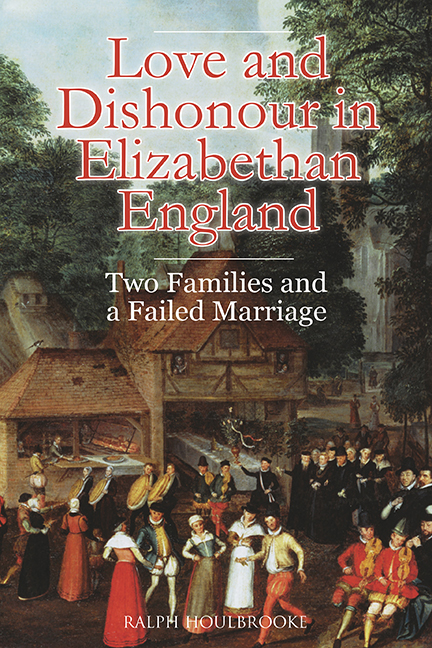Book contents
- Frontmatter
- Dedication
- Contents
- List of Illustrations
- Preface and Acknowledgements
- Notes on the Spelling of Names, Dates, and Currency
- List of Abbreviations
- map
- Miscellaneous Frontmatter
- Introduction
- Part I Two Families
- Part II An Unfortunate Marriage
- 4 A Clandestine Marriage
- 5 The End of the Marriage
- 6 Two Cases in the Court of Requests
- Part III Afterwards
- Bibliography
- Index
5 - The End of the Marriage
from Part II - An Unfortunate Marriage
Published online by Cambridge University Press: 13 July 2019
- Frontmatter
- Dedication
- Contents
- List of Illustrations
- Preface and Acknowledgements
- Notes on the Spelling of Names, Dates, and Currency
- List of Abbreviations
- map
- Miscellaneous Frontmatter
- Introduction
- Part I Two Families
- Part II An Unfortunate Marriage
- 4 A Clandestine Marriage
- 5 The End of the Marriage
- 6 Two Cases in the Court of Requests
- Part III Afterwards
- Bibliography
- Index
Summary
In June 1588, Elizabeth Forth allegedly wanted to visit her sister Frances Bedingfield, who was staying with her mother at a Bedingfield family property called Denham College. It lay some twenty-three miles from Butley between Eye and Wingfield Castle, one of Henry Jerningham's residences. The ‘College’ can be identified as a house standing at the north end of Denham village. Much of the moat that once surrounded the house can still be seen today, and its memory survives in the name ‘College Farm’ (see Plate 7). An inventory of the house's contents compiled in May 1590 indicates that the College was a simply furnished and second¬ary family residence that had seen better days. The dining chamber was ‘hanged aboute with patched old dornixe’ (a wool and linen fabric first made in Tournai), while the hall contained two plank tables and two plank forms. Another inventory compiled two months later reveals that both Frances Bedingfield and her mother Katherine Jerningham had chambers in the much more lavishly furnished Bedingfield town house in the London parish of St Bartholomew the Less.
Elizabeth had to persist in her efforts to persuade Charles to agree to her going, and his father allegedly tried to dissuade them, rebuking Charles, presumably for agreeing to the plan. Finally, however, as on several previous occasions, she was provided with men and horses for the journey. Charles went with her. To the Forths there seemed at first to be nothing unusual about the trip. This time, however, Elizabeth did not return to Butley for well over three and a half years.
About a month after Elizabeth's departure, in late July 1588, with the Spanish Armada in the Channel, the Privy Council ordered several counties to send militia contingents to London and other places. According to the Suffolk antiquary Robert Reyce, writing early in the following century, Robert Forth had charge of a band of 500 men. Forth remembered in 1593 that ‘commandment was geven for atten¬dance at Tylberrye for the better preservacion of her Majestie and the defence of this Realme’ against the intended Spanish invasion. Charles had accompanied him to Tilbury, where he remained ‘all that tyme of service’.
- Type
- Chapter
- Information
- Love and Dishonour in Elizabethan EnglandTwo Families and a Failed Marriage, pp. 143 - 170Publisher: Boydell & BrewerPrint publication year: 2018

